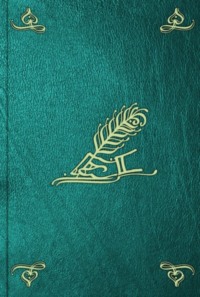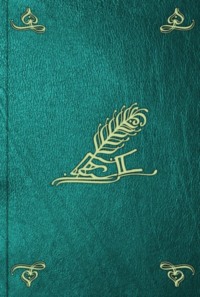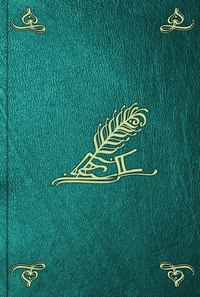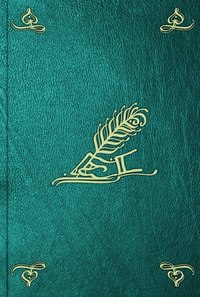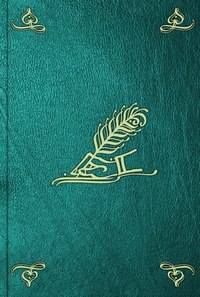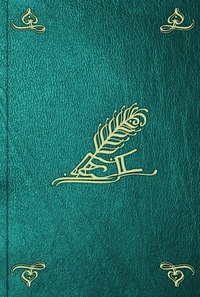 полная версия
полная версияMore Letters of Charles Darwin — Volume 1
LETTER 95. TO C. LYELL. Down, {February} 18th {1860}.
I send by this post Asa Gray, which seems to me very good, with the stamp of originality on it. Also Bronn's "Jahrbuch fur Mineralogie." (95/1. See Letter 93.)
The united intellect of my family has vainly tried to make it out. I never tried such confoundedly hard german; nor does it seem worth the labour. He sticks to Priestley's Green Matter, and seems to think that till it can be shown how life arises it is no good showing how the forms of life arise. This seems to me about as logical (comparing very great things with little) as to say it was no use in Newton showing the laws of attraction of gravity and the consequent movement of the planets, because he could not show what the attraction of gravity is.
The expression "Wahl der Lebens-Weise" (95/2. "Die fruchtbarste und allgemeinste Ursache der Varietaten-Bildung ist jedoch die Wahl der Lebens-Weise" (loc. cit., page 112).) makes me doubt whether B. understands what I mean by Natural Selection, as I have told him. He says (if I understand him) that you ought to be on the same side with me.
P.S. Sunday afternoon. — I have kept back this to thank you for your letter, with much news, received this morning. My conscience is uneasy at the time you waste in amusing and interesting me. I was very curious to hear about Phillips. The review in the "Annals" is, as I was convinced, by Wollaston, for I have had a very cordial letter from him this morning. (95/3. A bibliographical Notice "On the Origin of Species by means of Natural Selection; or the Preservation of Favoured Races in the Struggle for Life." ("Annals and Mag." Volume V., pages 132-43, 1860). The notice is not signed. Referring to the article, in a letter to Lyell, February 15th, 1860, Darwin writes: "I am perfectly convinced...that the review in the "Annals" is by Wollaston; no one else in the world would have used so many parentheses" ("Life and Letters," II., page 284).)
I send by this post an attack in the "Gardeners' Chronicle" by Harvey (a first-rate botanist, as you probably know). (95/4. In the "Gardeners' Chronicle" of February 18th, 1860, W.H. Harvey described a case of monstrosity in Begonia frigida, which he argued was hostile to the theory of Natural Selection. The passage about Harvey's attack was published in the "Life and Letters," II., page 275.) It seems to me rather strange; he assumes the permanence of monsters, whereas monsters are generally sterile, and not often inheritable. But grant his case, it comes {to this}, that I have been too cautious in not admitting great and sudden variations. Here again comes in the mischief of my abstract. In fuller MS. I have discussed the parallel case of a normal fish like a monstrous gold-fish.
I end my discussion by doubting, because all cases of monstrosities which resemble normal structures which I could find were not in allied groups. Trees like Aspicarpa (95/5. Aspicarpa, an American genus of Malpighiaceae, is quoted in the "Origin" (Edition VI., page 367) as an illustration of Linnaeus' aphorism that the characters do not give the genus, but the genus gives the characters. During several years' cultivation in France Aspicarpa produced only degraded flowers, which differed in many of the most important points of structure from the proper type of the order; but it was recognised by M. Richard that the genus should be retained among the Malpighiaceae. "This case," adds Darwin, "well illustrates the spirit of our classification."), with flowers of two kinds (in the "Origin"), led me also to speculate on the same subject; but I could find only one doubtfully analogous case of species having flowers like the degraded or monstrous flowers. Harvey does not see that if only a few (as he supposes) of the seedlings inherited being monstrosities, Natural Selection would be necessary to select and preserve them. You had better return the "Gardeners' Chronicle," etc., to my brother's. The case of Begonia (95/6. Harvey's criticism was answered by Sir J.D. Hooker in the following number of the "Gardeners' Chronicle" (February 25th, 1860, page 170).) in itself is very curious; I am tempted to answer the notice, but I will refrain, for there would be no end to answers.
With respect to your objection of a multitude of still living simple forms, I have not discussed it anywhere in the "Origin," though I have often thought it over. What you say about progress being only occasional and retrogression not uncommon, I agree to; only that in the animal kingdom I greatly doubt about retrogression being common. I have always put it to myself — What advantage can we see in an infusory animal, or an intestinal worm, or coral polypus, or earthworm being highly developed? If no advantage, they would not become highly developed: not but what all these animals have very complex structures (except infusoria), and they may well be higher than the animals which occupied similar places in the economy of nature before the Silurian epoch. There is a blind snake with the appearances and, in some respects, habits of earthworms; but this blind snake does not tend, as far as we can see, to replace and drive out worms. I think I must in a future edition discuss a few more such points, and will introduce this and H.C. Watson's objection about the infinite number of species and the general rise in organisation. But there is a directly opposite objection to yours which is very difficult to answer — viz. how at the first start of life, when there were only the simplest organisms, how did any complication of organisation profit them? I can only answer that we have not facts enough to guide any speculation on the subject.
With respect to Lepidosiren, Ganoid fishes, perhaps Ornithorhynchus, I suspect, as stated in the "Origin," (95/7. "Origin of Species" (Edition VI.), page 83.), that they have been preserved, from inhabiting fresh-water and isolated parts of the world, in which there has been less competition and less rapid progress in Natural Selection, owing to the fewness of individuals which can inhabit small areas; and where there are few individuals variation at most must be slower. There are several allusions to this notion in the "Origin," as under Amblyopsis, the blind cave-fish (95/8. "Origin," page 112.), and under Heer (95/9. "Origin," page 83.) about Madeira plants resembling the fossil and extinct plants of Europe.
LETTER 96. TO JAMES LAMONT. Down, March 5th {1860?}.
I am much obliged for your long and interesting letter. You have indeed good right to speak confidently about the habits of wild birds and animals; for I should think no one beside yourself has ever sported in Spitzbergen and Southern Africa. It is very curious and interesting that you should have arrived at the conclusion that so-called "Natural Selection" had been efficient in giving their peculiar colours to our grouse. I shall probably use your authority on the similar habits of our grouse and the Norwegian species.
I am particularly obliged for your very curious fact of the effect produced by the introduction of the lowland grouse on the wildness of the grouse in your neighbourhood. It is a very striking instance of what crossing will do in affecting the character of a breed. Have you ever seen it stated in any sporting work that game has become wilder in this country? I wish I could get any sort of proof of the fact, for your explanation seems to me equally ingenious and probable. I have myself witnessed in South America a nearly parallel {case} with that which you mention in regard to the reindeer in Spitzbergen, with the Cervus campestris of La Plata. It feared neither man nor the sound of shot of a rifle, but was terrified at the sight of a man on horseback; every one in that country always riding. As you are so great a sportsman, perhaps you will kindly look to one very trifling point for me, as my neighbours here think it too absurd to notice — namely, whether the feet of birds are dirty, whether a few grains of dirt do not adhere occasionally to their feet. I especially want to know how this is in the case of birds like herons and waders, which stalk in the mud. You will guess that this relates to dispersal of seeds, which is one of my greatest difficulties. My health is very indifferent, and I am seldom able to attend the scientific meetings, but I sincerely hope that I may some time have the pleasure of meeting you.
Pray accept my cordial thanks for your very kind letter.
LETTER 97. TO G.H.K. THWAITES. Down, March 21st {1860}.
I thank you very sincerely for your letter, and am much pleased that you go a little way with me. You will think it presumptuous, but I am well convinced from my own mental experience that if you keep the subject at all before your mind you will ultimately go further. The present volume is a mere abstract, and there are great omissions. One main one, which I have rectified in the foreign editions, is an explanation (which has satisfied Lyell, who made the same objection with you) why many forms do not progress or advance (and I quite agree about some retrograding). I have also a MS. discussion on beauty; but do you really suppose that for instance Diatomaceae were created beautiful that man, after millions of generations, should admire them through the microscope? (97/1. Thwaites (1811-82) published several papers on the Diatomaceae ("On Conjugation in the Diatomaceae," "Ann. and Mag. Nat. Hist." Volume XX., 1847, pages 9-11, 343-4; "Further Observations on the Diatomaceae," loc. cit., 1848, page 161). See "Life and Letters" II., page 292.) I should attribute most of such structures to quite unknown laws of growth; and mere repetition of parts is to our eyes one main element of beauty. When any structure is of use (and I can show what curiously minute particulars are often of highest use), I can see with my prejudiced eyes no limit to the perfection of the coadaptations which could be effected by Natural Selection. I rather doubt whether you see how far, as it seems to me, the argument for homology and embryology may be carried. I do not look at this as mere analogy. I would as soon believe that fossil shells were mere mockeries of real shells as that the same bones in the foot of a dog and wing of a bat, or the similar embryo of mammal and bird, had not a direct signification, and that the signification can be unity of descent or nothing. But I venture to repeat how much pleased I am that you go some little way with me. I find a number of naturalists do the same, and as their halting-places are various, and I must think arbitrary, I believe they will all go further. As for changing at once one's opinion, I would not value the opinion of a man who could do so; it must be a slow process. (97/2. Darwin wrote to Woodward in regard to the "Origin": "It may be a vain and silly thing to say, but I believe my book must be read twice carefully to be fully understood. You will perhaps think it by no means worth the labour.") Thank you for telling me about the Lantana (97/3. An exotic species of Lantana (Verbenaceae) grows vigorously in Ceylon, and is described as frequently making its appearance after the firing of the low-country forests (see H.H.W. Pearson, "The Botany of the Ceylon Patanas," "Journal Linn. Soc." Volume XXXIV., page 317, 1899). No doubt Thwaites' letter to Darwin referred to the spreading of the introduced Lantana, comparable to that of the cardoon in La Plata and of other plants mentioned by Darwin in the "Origin of Species" (Edition VI., page 51).), and I should at any time be most grateful for any information which you think would be of use to me. I hope that you will publish a list of all naturalised plants in Ceylon, as far as known, carefully distinguishing those confined to cultivated soils alone. I feel sure that this most important subject has been greatly undervalued.
LETTER 98. TO T.H. HUXLEY.
(98/1. The reference here is to the review on the "Origin of Species" generally believed to be by the late Sir R. Owen, and published in the April number of the "Edinburgh Review," 1860. Owen's biographer is silent on the subject, and prints, without comment, the following passage in an undated letter from Sedgwick to Owen: "Do you know who was the author of the article in the "Edinburgh" on the subject of Darwin's theory? On the whole, I think it very good. I once suspected that you must have had a hand in it, and I then abandoned that thought. I have not read it with any care" (Owen's "Life," Volume II., page 96).
April 9th {1860}.
I never saw such an amount of misrepresentation. At page 530 (98/2. "Lasting and fruitful conclusions have, indeed, hitherto been based only on the possession of knowledge; now we are called upon to accept an hypothesis on the plea of want of knowledge. The geological record, it is averred, is so imperfect!" — "Edinburgh Review," CXI., 1860, page 530.) he says we are called on to accept the hypothesis on the plea of ignorance, whereas I think I could not have made it clearer that I admit the imperfection of the Geological Record as a great difficulty.
The quotation (98/3. "We are appealed to, or at least 'the young and rising naturalists with plastic minds,* {On the Nature of the Limbs, page 482} are adjured." It will be seen that the inverted comma after "naturalists" is omitted; the asterisk referring, in a footnote (here placed in square brackets), to page 482 of the "Origin," seems to have been incorrectly assumed by Mr. Darwin to show the close of the quotation. — Ibid., page 512.) on page 512 of the "Review" about "young and rising naturalists with plastic minds," attributed to "nature of limbs," is a false quotation, as I do not use the words "plastic minds."
At page 501 (98/4. The passage ("Origin," Edition I., page 483) begins, "But do they really believe..." and shows clearly that the author considers such a belief all but impossible.) the quotation is garbled, for I only ask whether naturalists believe about elemental atoms flashing, etc., and he changes it into that I state that they do believe.
At page 500 (98/5. "All who have brought the transmutation speculation to the test of observed facts and ascertained powers in organic life, and have published the results, usually adverse to such speculations, are set down by Mr. Darwin as 'curiously illustrating the blindness of preconceived opinion.'" The passage in the "Origin," page 482, begins by expressing surprise at the point of view of some naturalists: "They admit that a multitude of forms, which till lately they themselves thought were special creations...have been produced by variation, but they refuse to extend the same view to other and very slightly different forms...They admit variation as a vera causa in one case, they arbitrarily reject it in another, without assigning any distinction in the two cases. The day will come when this will be given as a curious illustration of the blindness of preconceived opinion.") it is very false to say that I imply by "blindness of preconceived opinion" the simple belief of creation. And so on in other cases. But I beg pardon for troubling you. I am heartily sorry that in your unselfish endeavours to spread what you believe to be truth, you should have incurred so brutal an attack. (98/6. The "Edinburgh" Reviewer, referring to Huxley's Royal Institution Lecture given February 10th, 1860, "On Species and Races and their Origin," says (page 521), "We gazed with amazement at the audacity of the dispenser of the hour's intellectual amusement, who, availing himself of the technical ignorance of the majority of his auditors, sought to blind them as to the frail foundations of 'natural selection' by such illustrations as the subjoined": And then follows a critique of the lecturer's comparison of the supposed descent of the horse from the Palaeothere with that of various kinds of domestic pigeons from the Rock-pigeon.) And now I will not think any more of this false and malignant attack.
LETTER 99. TO MAXWELL MASTERS. Down, April 13th {1860}.
I thank you very sincerely for your two kind notes. The next time you write to your father I beg you to give him from me my best thanks, but I am sorry that he should have had the trouble of writing when ill. I have been much interested by the facts given by him. If you think he would in the least care to hear the result of an artificial cross of two sweet peas, you can send the enclosed; if it will only trouble him, tear it up. There seems to be so much parallelism in the kind of variation from my experiment, which was certainly a cross, and what Mr. Masters has observed, that I cannot help suspecting that his peas were crossed by bees, which I have seen well dusted with the pollen of the sweet pea; but then I wish this, and how hard it is to prevent one's wish biassing one's judgment!
I was struck with your remark about the Compositae, etc. I do not see that it bears much against me, and whether it does or not is of course of not the slightest importance. Although I fully agree that no definition can be drawn between monstrosities and slight variations (such as my theory requires), yet I suspect there is some distinction. Some facts lead me to think that monstrosities supervene generally at an early age; and after attending to the subject I have great doubts whether species in a state of nature ever become modified by such sudden jumps as would result from the Natural Selection of monstrosities. You cannot do me a greater service than by pointing out errors. I sincerely hope that your work on monstrosities (99/1. "Vegetable Teratology," London, 1869 (Ray Soc.).) will soon appear, for I am sure it will be highly instructive.
Now for your notes, for which let me again thank you.
1. Your conclusion about parts developed (99/2. See "Origin of Species," Edition I., page 153, on the variability of parts "developed in an extraordinary manner in any one species, compared with the other species of the same genus." See "Life and Letters," II., pages 97, 98, also Letter 33.) not being extra variable agrees with Hooker's. You will see that I have stated that the rule apparently does not hold with plants, though it ought, if true, to hold good with them.
2. I cannot now remember in what work I saw the statement about Peloria affecting the axis, but I know it was one which I thought might be trusted. I consulted also Dr. Falconer, and I think that he agreed to the truth of it; but I cannot now tell where to look for my notes. I had been much struck with finding a Laburnum tree with the terminal flowers alone in each raceme peloric, though not perfectly regular. The Pelargonium case in the "Origin" seems to point in the same direction. (99/3. "Origin of Species," Edition I., page 145.)
3. Thanks for the correction about furze: I found the seedlings just sprouting, and was so much surprised and their appearance that I sent them to Hooker; but I never plainly asked myself whether they were cotyledons or first leaves. (99/4. The trifoliate leaves of furze seedlings are not cotyledons, but early leaves: see Lubbock's "Seedlings," I., page 410.)
4. That is a curious fact about the seeds of the furze, the more curious as I found with Leguminosae that immersion in plain cold water for a very few days killed some kinds.
If at any time anything should occur to you illustrating or opposing my notions, and you have leisure to inform me, I should be truly grateful, for I can plainly see that you have wealth of knowledge.
With respect to advancement or retrogression in organisation in monstrosities of the Compositae, etc., do you not find it very difficult to define which is which?
Anyhow, most botanists seem to differ as widely as possible on this head.
LETTER 100. TO J.S. HENSLOW. Down, May 8th {1860}.
Very many thanks about the Elodea, which case interests me much. I wrote to Mr. Marshall (100/1. W. Marshall was the author of "Anacharis alsinastrum, a new water-weed": four letters to the "Cambridge Independent Press," reprinted as a pamphlet, 1852.) at Ely, and in due time he says he will send me whatever information he can procure.
Owen is indeed very spiteful. (100/2. Owen was believed to be the author of the article in the "Edinburgh Review," April, 1860. See Letter 98.) He misrepresents and alters what I say very unfairly. But I think his conduct towards Hooker most ungenerous: viz., to allude to his essay (Australian Flora), and not to notice the magnificent results on geographical distribution. The Londoners say he is mad with envy because my book has been talked about; what a strange man to be envious of a naturalist like myself, immeasurably his inferior! From one conversation with him I really suspect he goes at the bottom of his hidden soul as far as I do.
I wonder whether Sedgwick noticed in the "Edinburgh Review" about the "Sacerdotal revilers," — so the revilers are tearing each other to pieces. I suppose Sedgwick will be very fierce against me at the Philosophical Society. (100/3. The meeting of the "Cambridge Phil. Soc." was held on May 7th, 1860, and fully reported in the "Cambridge Chronicle," May 19th. Sedgwick is reported to have said that "Darwin's theory is not inductive — is not based on a series of acknowledged facts, leading to a general conclusion evolved, logically out of the facts...The only facts he pretends to adduce, as true elements of proof, are the varieties produced by domestication and the artifices of crossbreeding." Sedgwick went on to speak of the vexatious multiplication of supposed species, and adds, "In this respect Darwin's theory may help to simplify our classifications, and thereby do good service to modern science. But he has not undermined any grand truth in the constancy of natural laws, and the continuity of true species.") Judging from his notice in the "Spectator," (100/4. March 24th, 1860; see "Life and Letters," II., page 297.) he will misrepresent me, but it will certainly be unintentionally done. In a letter to me, and in the above notice, he talks much about my departing from the spirit of inductive philosophy. I wish, if you ever talk on the subject to him, you would ask him whether it was not allowable (and a great step) to invent the undulatory theory of light, i.e. hypothetical undulations, in a hypothetical substance, the ether. And if this be so, why may I not invent the hypothesis of Natural Selection (which from the analogy of domestic productions, and from what we know of the struggle for existence and of the variability of organic beings, is, in some very slight degree, in itself probable) and try whether this hypothesis of Natural Selection does not explain (as I think it does) a large number of facts in geographical distribution — geological succession, classification, morphology, embryology, etc. I should really much like to know why such an hypothesis as the undulation of the ether may be invented, and why I may not invent (not that I did invent it, for I was led to it by studying domestic varieties) any hypothesis, such as Natural Selection.
Pray forgive me and my pen for running away with me, and scribbling on at such length.
I can perfectly understand Sedgwick (100/5. See "Life and Letters," II., page 247; the letter is there dated December 24th, but must, we think, have been written in November at latest.) or any one saying that Natural Selection does not explain large classes of facts; but that is very different from saying that I depart from right principles of scientific investigation.
LETTER 101. TO J.S. HENSLOW. Down, May 14th {1860}.
I have been greatly interested by your letter to Hooker, and I must thank you from my heart for so generously defending me, as far as you could, against my powerful attackers. Nothing which persons say hurts me for long, for I have an entire conviction that I have not been influenced by bad feelings in the conclusions at which I have arrived. Nor have I published my conclusions without long deliberation, and they were arrived at after far more study than the public will ever know of, or believe in. I am certain to have erred in many points, but I do not believe so much as Sedgwick and Co. think.
Is there any Abstract or Proceedings of the Cambridge Philosophical Society published? (101/1. Henslow's remarks are not given in the above-mentioned report in the "Cambridge Chronicle.") If so, and you could get me a copy, I should like to have one.



